| Rating | Not Rated |
| Time | 85 minutes |
| Release | PBS |
| 5-Star Rating |     |
| Director | Eric Till |
| Executive Producers | Gabriela
Pfandner, Kurt Rittig, Chrisan Stehr, Alexander Thies
Thomas Doggett, Oregon
Public Broadcasting
Byron Knight, Wisconsin Public Television
Rosemarie
Wintgen, Ostdeutscher Rundfunk Brandenburg |
| Screenplay | Gareth
Jones |
| Director of Photography | Sebastian
Richter |
| Genre | Biographical,
inspirational |
STARRING:
Ulrich Tukur (Dietrich Bonhoeffer)
Johanna Klante (Maria von Wedemyer)
Robert Joy (Manfred Roeder)
R.H. Thomson (Knobloch)
Ulrich Noethen (Hans von Dohnanyi)
Tatjana Blacher (Christel von Dohnanyi)
Richard Parkington (Reinhold Niebuhr)
 -- "If your
opponent has a conscience, then follow Ghandi and non-violence. But if your enemy
has no conscience like Hitler, then follow Bonhoeffer" Rev. Martin Luther King
Jr.
-- "If your
opponent has a conscience, then follow Ghandi and non-violence. But if your enemy
has no conscience like Hitler, then follow Bonhoeffer" Rev. Martin Luther King
Jr.
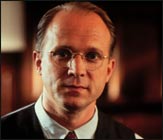 What does a Christian do when faced with
the choice of following an immoral natural law or adhering to God's law?
What does a Christian do when faced with
the choice of following an immoral natural law or adhering to God's law?
Throughout
the history of the church, Christians have grappled with this dilemma. Does one
blindly follow the apostle Paul's admonition in Romans, chapter 13, "Everyone
must submit himself to the governing authorities, for there is no authority except
that which God has established"? Or is a believer bound to obey God's law of love,
grace and forgiveness even if it means disobeying an evil law of men?
In
Nazi Germany, the church was faced with the choice of loyalty to Adolf Hitler,
or to the God of the Bible. Sadly, many chose to take the oath of allegiance to
Hitler: "I swear to be true and obedient to the fuhrer of the German Reich, Adolf
Hitler, to abide by the law and fulfill my duty, so help me God."
But one
courageous man decided to follow the law of God above the Nazi laws of hate --
Dr. Dietrich Bonhoeffer. A German theologian and clergyman of great distinction,
Bonhoeffer actively opposed Hitler and the Nazis at great personal risk. His convictions
eventually cost him his life at the hands of the Gestapo.
Bonhoeffer's last
years, his participation in the German resistance and his moral struggle are dramatized
in Bonhoeffer: Agent of Grace.
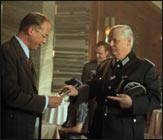 This is the
compelling account of theologian and pastor Dietrich Bonhoeffer, a man of faith
driven to agonizing ethical decisions in Nazi Germany. The actions of Bonhoeffer
raise questions about justice, service, sacrifice and moral responsibility --
issues that most people are likely to struggle with at some time in life.
This is the
compelling account of theologian and pastor Dietrich Bonhoeffer, a man of faith
driven to agonizing ethical decisions in Nazi Germany. The actions of Bonhoeffer
raise questions about justice, service, sacrifice and moral responsibility --
issues that most people are likely to struggle with at some time in life.
More
than just a biographical film, Bonhoeffer: Agent of Grace sheds light on
the little-known efforts of the German resistance. This award-winning film --
directed by Eric Till and shot in the Czech Republic, Berlin and Canada -- brings
to a wide audience the heroic rebellion of Bonhoeffer, a highly regarded Lutheran
minister who could have kept his peace and saved his life on several occasions,
but instead paid the ultimate price for his beliefs.
Early in the movie,
Bonhoeffer makes his position clear.
"Let's not delude ourselves that if
we take the loyalty oath to Hitler it means they'll let us worship in peace. The
Nuremberg laws are an attack on Christianity itself. Adolf Hitler demands nothing
less than total commitment. He's the elected chancellor, yes. But more than that,
he considers himself de Fuhrer, and as "the leader," he craves to be the conscience
of every living German. But his claim upon us is a claim that a Christian can
only accept from Christ Himself."
In exasperation he cries out, "The Reichsbishop
is rewriting Holy Scripture!"
And Bonhoeffer is not only concerned with
Hitler's attack on Christianity. He also voices his concern for the Jews.
"Only
those who cry out for the Jew have the right to sing Gregorian chants! Christ
himself was a Jew, and in the eyes of the Lord we are all one."
Bonhoeffer
realized that the evil nature of the Nazi's would force him to oppose his own
government and lie to cover his actions and the actions of his family and close
friends. The atrocities of Hitler moved this theologian to political action.
To
aid the German resistance, Bonhoeffer became a part of a secret group that worked
to overthrow Hitler, and also smuggled Jews out of the country. Because of his
contacts with other theologians outside of Germany, Bonhoeffer was used as a courier
to carry messages to the allies about the anti-Hitler movement.
But like
Corrie Ten Boom, another Christian who faced the same moral dilemma, he was uneasy
in this life of deception. In one moving scene, a Jewish friend who he is smuggling
out of the country turns to Bonhoeffer and exclaims, "So many lies. So much deception
Please, Dietrich, don't win the war only to lose your soul."
Bonhoeffer
finally comes to the conclusion that he must choose the lesser of two evils. When
talking with an allied theologian about their attempt to assassinate Hitler, Bonhoeffer
declares, "I believe it is worse to be evil than to do evil."
The film opens
in the late 1930s in the United States. Bonhoeffer has left behind the trials
and struggles of his homeland where he has been forbidden to teach, and is exploring
the spiritual vitality of the African-American church. But his conscience won't
allow him to stay out of the struggle and he returns to his native Germany.
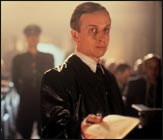 A vocal critic of Hitler and the Nazis from
the start, he rebels against church leaders complicit in the rise of the Third
Reich. During this outspoken period, a church meeting is broken up by the Gestapo
under the leadership of Nazi judge Manfred Roeder (played by actor Robert Joy).
Bonhoeffer is thereafter forbidden to preach in public or publish his writings,
and he will be closely observed by the Gestapo.
A vocal critic of Hitler and the Nazis from
the start, he rebels against church leaders complicit in the rise of the Third
Reich. During this outspoken period, a church meeting is broken up by the Gestapo
under the leadership of Nazi judge Manfred Roeder (played by actor Robert Joy).
Bonhoeffer is thereafter forbidden to preach in public or publish his writings,
and he will be closely observed by the Gestapo.
Germany's racial laws affect
Bonhoeffer's family. His twin sister is married to a Jew. Bonhoeffer advises them
to leave the country, as he is convinced Hitler will make the threats against
Jews a reality. His fears are soon confirmed.
As the situation in Germany
becomes more oppressive, Bonhoeffer is persuaded to join the resistance. He goes
to work for the Abwehr, a German military intelligence agency, and serves as a
courier to the allies.
After the resistance's first failed assassination
attempt on Hitler, the Gestapo initiates a wave of arrests that sweeps up Bonhoeffer.
They have no concrete evidence against him, but Judge Roeder continues his suspicion
of the pastor. Bonhoeffer endures countless interrogations and humiliations without
giving the resistance away, and his faith is strongly put to the test.
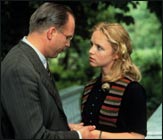 As he struggles in prison with doubt, fear
and his own doctrinal positions, Dr. Bonhoeffer writes a number of practical texts
on Christian living. He writes several moving letters to his fiancie, Maria, along
with some poetry. These words, penned in the midst of incredible agony, provide
a window to the struggle within Bonhoeffer in this dark time.
As he struggles in prison with doubt, fear
and his own doctrinal positions, Dr. Bonhoeffer writes a number of practical texts
on Christian living. He writes several moving letters to his fiancie, Maria, along
with some poetry. These words, penned in the midst of incredible agony, provide
a window to the struggle within Bonhoeffer in this dark time.
The film shows
the pastor in the solitude of his dank cell, grappling with the questions haunting
his soul:
Who am I?
They often tell me I stepped from my cell's confinement
calmly, cheerfully, firmly, like a squire from his country-house.
Who am
I?
They also tell me I bore the days of misfortune equably, smilingly, proudly,
like one accustomed to win.
Am I then really all that which other men tell
of?
Or am I only what I myself know of myself? Restless and longing and sick,
like a bird in a cage, struggling for breath, as though hands were compressing
my throat, yearning for colors, for flowers, for the voices of birds, thirsting
for words of kindness, for neighborliness, faint, and ready to say farewell to
it all?
Let those people out!
Or am I both at once, a hypocrite to some
and to myself a contemptible weakling.
Who am I?
Finally, the tortured
man finds comfort in the arms of his Savior:
Whoever I am, you know, dear
God, I shall always belong to you.
In the end, evidence is found by the
Gestapo connecting Bonhoeffer to the German resistance. Dr. Bonhoeffer is hung
at Flossenberg prison at the order of Adolf Hitler -- just 22 days before Hitler
himself commits suicide in a Berlin bunker ending the war in Germany.
The
prison doctor later described the scene of the theologian's death to reporters.
"Through the half-open door I saw Pastor Bonhoeffer still in his prison clothes,
kneeling in fervent prayer to the Lord his God. The devotion and evident conviction
of being heard that I saw in the prayer of this intensely captivating man moved
me to the depths." The prisoners were ordered to strip. Naked under the scaffold,
Bonhoeffer knelt for one last time to pray.
In the PBS movie, Bonhoeffer
faces the hangman's noose with a verbal prayer, "Father, give thy servants that
peace which the world cannot give."
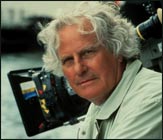 I applaud PBS for broadcasting such a dramatic
testament to a man of God, living out his beliefs and values in the face of persecution
and death. They have stayed true to the real events of Bonhoeffer's life. The
production values are superb, the acting is subdued and believable, and the story
is compelling. Much praise goes to director Eric Till. I am also impressed with
the work of cinematographer Sebastian Richter, for his tasteful, and in places,
brilliant photography.
I applaud PBS for broadcasting such a dramatic
testament to a man of God, living out his beliefs and values in the face of persecution
and death. They have stayed true to the real events of Bonhoeffer's life. The
production values are superb, the acting is subdued and believable, and the story
is compelling. Much praise goes to director Eric Till. I am also impressed with
the work of cinematographer Sebastian Richter, for his tasteful, and in places,
brilliant photography.
Exceptional performances are given by Ulrich Tukur
as Bonhoeffer and Robert Joy as Judge Roeder. The contrast between what is good
and evil, moral and immoral is embodied in these two characters. Their interaction
provides suspense and moral conflict throughout the story.
This is a movie that every Christian should watch.
It is an opportunity for the world to see a powerful
story about a contemporary Christian hero and martyr.
In life and in death Dietrich Bonhoeffer gave glory
to Jesus Christ -- he is a role model for people everywhere.
More from
Craig von Buseck on CBN.com
For more information on
Bonhoeffer:
Agent of Grace click here.
To learn more about Dietrich Bonhoeffer,
visit the International
Bonhoeffer Society or the U.S. Holocaust
Memorial Museum web site.
Comments? Tell me what you think.